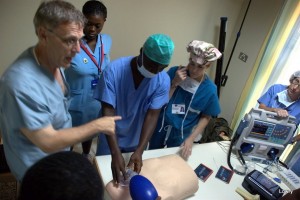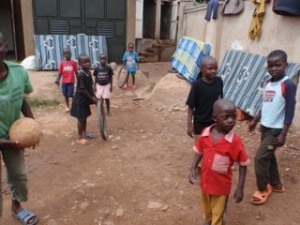 Since 1987, with its league of dedicated volunteers, CardioStart International has strived to play a role in the ever-advancing need to fight the world’s #1 killer– cardiovascular disease (CVD).
Since 1987, with its league of dedicated volunteers, CardioStart International has strived to play a role in the ever-advancing need to fight the world’s #1 killer– cardiovascular disease (CVD).
Most recent data shows that 17.3 million people died of CVD in 2008. Eighty percent of those were from poor and middle-income countries.
Despite medical advances and significant declines in cardiovascular deaths, a considerable gap in access to cardiovascular healthcare between developed and undeveloped countries continues to widen. Although a large proportion of CVDs is preventable, deaths continue to rise mainly because preventive measures are inadequate.
In light of these alarming statistics, CardioStart and its worldwide volunteers conduct two-week missions in such countries as Peru, Haiti, Uganda and Vietnam. To date, CardioStart has completed 55 comprehensive missions in 27 countries. As part of each surgical mission, the medical team of 30-40 volunteers collaborates with the local hospital’s staff to perform advanced cardiac surgery, pacemaker implantations, teach cardiac surgical techniques, ICU procedures and other patient care.
CardioStart’s intent is to teach the local doctors and nurses advanced cardiac care, elevating surgical outcomes and overall patient care long after CardioStart volunteers depart the country.
Medical Supply Shipments
To date, CardioStart has shipped 40 cargo containers and 12 pallets of much-needed medical supplies and equipment to countries where upcoming missions will take place. All supplies that CardioStart ships are donated from US hospitals. Most supplies are received from All Children’s Hospital in St. Petersburg, Florida. In early 2012, CardioStart shipped two 40-foot containers to Uganda, Africa. The containers’ value totaled more than one million dollars of crucial medical supplies.
Outreach Efforts
 During CardioStart missions, medical and non-medical volunteers enjoy taking part in several outreach activities. Some projects involve helping to repair physical structures of orphanages, schools or an elderly group home such as painting, cleaning, landscaping and light renovation projects.
During CardioStart missions, medical and non-medical volunteers enjoy taking part in several outreach activities. Some projects involve helping to repair physical structures of orphanages, schools or an elderly group home such as painting, cleaning, landscaping and light renovation projects.
Other outreach efforts include conducting physical exams and health assessments of the poor who have little to no access to healthcare. Volunteers teach in areas of personal hygiene, nutrition, dental practices and wound care as well as warning signs and symptoms of heart attack and stroke.
Some outreach projects address issues related to stress and emotional health. Volunteers helped children and adults with music and art therapy, exercise, and relaxation techniques.